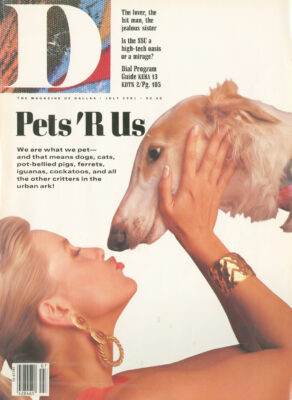“Recycling should be mandatory. Everybody should have to do it all the time. There ought to be really stiff fines, horrendous fines, for people who don’t recycle or reuse their trash. “
Joanne Hill preaches the new gospel of recycling with the cadence and fervor that belong to fundamentalist churches of the rural South. Her voice grows in pitch and volume as she lays out the tenets of the faith: “Our society has to do this because it is the right thing to do. ” Her words tumble rapidly as she rails against the infidels: “It’s hard to believe that there is anybody who doesn’t care about the world we are making for our children. “
For the past five years. Hill has marched at the head of a crusade based on the idea that one man’s trash can be recreated as someone else’s treasure. She has organized the nonprofit Dry Gulch Recycling Centers in Dallas and Garland, and she has given thousands of hours of her time to operate them successfully. She has served on local and state committees that encourage recycling and husbanding of the environment. She has pounded the pulpits of city hall, neighborhood associations, and community organizations across the length and breadth of Dallas.
In general, results have been disappointing. Hill says. Action has been limited and slow to develop. Apathy has greeted her message more often than not. Still, Hill says she and other true believers have won their share of converts. The new en-; vironmental theology, she claims, is spreading through the city.
In August and September, the proselyters will face their toughest test. Dallas City Council is due to decide whether residential recycling should be part of public policy. After they confront a monumental budget crunch, council members must evaluate a pilot recycling program and attempt to answer several questions:
Can citywide recycling help improve the environment by reducing (he flow of rubble into local landfills? Should residents who don’t cooperate face heavy fines or maybe even jail? Will taxpayers foot the bill? Can the city afford recycling?
Hill and her allies intend to fight for a mandatory program from the floor of the council chamber. But their moral and philosophical arguments that recycling is the right thing to do will likely run smack into the hard realities of politics and economics. Besides, despite an opinion survey by Clean Dallas that found residents ready in theory to recycle, few carry their conviction to the curb side. While no formal assessment of the pilot program has yet been done, indications are that the test project is a well-meant but expensive failure.
Started late last year, the pilot program offers weekly curb-side collection of recyclables to 14, 000 local homes. A private contractor, Dallas-based Commercial Metals Company (CMC), provides a storage bin for each house and sends trucks to pick up glass. newspapers, plastics, and metal cans. All residents have to do is loss discards into the bins. CMC workers manually separate the materials as they load their trucks.
Levi Davis, the assistant city manager responsible for recycling, says he has not kept up with the pilot program and has no idea how residents like it, But Gavino Sotelo, director of street and sanitation, says people in the 16 test areas-two for each council district-apparently don’t care much for it.
“We designed this program to be as easy as possible for residents, ” says Sotelo. “We don’t require people to separate recyclable materials, and we don’t ask them to carry materials farther than to the curb. Still, participation is not what we had hoped. While recycling is in the forefront of people’s minds, not everyone is willing to participate. “
In fact, only 4, 700 households, about one-third of the homes in the test neighborhoods, have left recyclables for collection since the program began six months ago, Sotelo says. Of the remaining two-thirds, most have simply ignored the program. But a few have strongly objected to what they see as one more governmental intrusion.
“’We have actually had people throw the containers at the collection crews, ” says Sotelo. “It’s hard to imagine why some people object so strongly to recycling, but they do. “
“That’s why you can’t make the program voluntary, ” says Hill. “A lot of people just don’t understand how important recycling is. They don’t see what a difference it can make. “
After six months of experience, Sotelo is not sure that residential recycling makes any significant difference in the mountain of garbage Dallas households generate each year. “We haven’t seen much effect on garbage collection at all, ” he says. “It’s not very much waste being removed from the waste stream. “
An average Dallas family, Sotelo says, discards about 4, 000 pounds of trash, garbage, leaves, and lawn clippings each year. That means Sotelo’s department piles roughly a half-million tons of gunk and junk into landfills every 12 months. Studies show that much of that debris will still be there, intact, in 200 years.
But residential recycling offers little relief to the collection crews who heave garbage bags into their trucks or to the landfills that ultimately accept the detritus. If every Dallas residence recycled material at the same rate that the 4, 700 homes active in the pilot program have over the past six months, only 88. 000 tons of garbage, about 17 percent, would be carved from the mountain.
“I don’t know if residential recycling would keep the landfills from filling up, ” says Sotelo. “I don’t know if the city could cut garbage collection costs or save any money. “
What Sotelo does know is that a city wide recycling program similar to the current pilot would severely tax the city budget. CMC currently charges Dallas $1. 75 a month for each of the 14, 000 homes in the test area. (CMC also keeps whatever it collects from reselling the material. ) If the program could be extended citywide for the same fee, the cost-without service to businesses and apartments-would approach $5 million a year.
“That’s more money than I want to think about, ” says Sotelo.
Grants from private companies and the federal government cover part of the cost of the pilot project. The rest of the money comes from an environmental protection fee of 50 cents a month which the council added to water bills last year.
“If we did it citywide, 1 imagine we would have to raise the environmental protection fee enough to cover the costs, ” says Sotelo. “1 think a lot of people would object to that. I don’t know anything about the politics of the idea, but it could be hard to get it through the city council. “
Neither Sotelo nor Levi Davis is prepared to say what kind of recycling program, if any, the staff will recommend at the end of the pilot project. However, if residential recycling goes city wide, Sotelo favors a plan similar to one recently adopted in the Park Cities, where families who want recycling service subscribe to it in the same way that they might subscribe to cable television. They pay $2 a month for pickup and $5. 25 for each collection bin they order.
“The advantage is that those who want to recycle will pay for it, ” Sotelo explains, “I really don’t see any disadvantages. You’re providing a service and making it available to all citizens. “
But Hill and her cadre of environmentalists insist that a subscription service is wholly unacceptable. Though she concedes that a curb-side recycling fee could work a hardship on low-income families, Hill argues that even the poor should gladly bear the price of protecting the planet.
“Those people are more concerned about paying rent and putting food on the table, ” she says. “They feel helpless. We have to make them see that recycling empowers them. This is one place where every individual can make a difference. “
For his part, Sotelo contends that recycling ought to begin with business, not in the home. Much of what companies throw away, including mammoth stacks of computer paper, is in demand by recycling companies. And because businesses pay their waste contractors by volume, diverting materials from dump-sters to recycling bins could cut overall costs.
“A lot of businesses generate material that a recycling company would actually pay for instead of charging to haul it away. ” says Sotelo. “Businesses could benefit not only from what (hey make by selling it, but also from what they save by not throwing it away. There’s a good economic reason for businesses to recycle. That’s where we can really make a difference. “
In the final analysis, economics probably holds the key to successful recycling. Faith and fervor likely won’t get the job done.
As Sotelo has learned from experience in the pilot residential recycling program, “You’ve got to show people how they can benefit from a program like this. Most people won’t do it just because it’s right. “
Get our weekly recap
Brings new meaning to the phrase Sunday Funday. No spam, ever.
Related Articles

Media
Will Evans Is Now Legit
The founder of Deep Vellum gets his flowers in the New York Times. But can I quibble?
By Tim Rogers

Restaurant Reviews
You Need to Try the Sunday Brunch at Petra and the Beast
Expect savory buns, super-tender fried chicken, slabs of smoked pork, and light cocktails at the acclaimed restaurant’s new Sunday brunch service.

Arts & Entertainment
DIFF Preview: How the Death of Its Subject Caused a Dallas Documentary to Shift Gears
Michael Rowley’s Racing Mister Fahrenheit, about the late Dallas businessman Bobby Haas, will premiere during the eight-day Dallas International Film Festival.
By Todd Jorgenson


